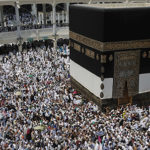The Syrian refugee crisis is one of the great humanitarian tests of our era. Christians worldwide have responded in some of the most beautiful and ugly ways imaginable to this crisis.
 Christian van GorderThere is no place for Islamophobic fear among Christians, but one also must look at this crisis within its larger context. How we respond to this crisis—both humanely and firmly—will dramatically define the advance of healthy Christian-Muslim interactions.
Christian van GorderThere is no place for Islamophobic fear among Christians, but one also must look at this crisis within its larger context. How we respond to this crisis—both humanely and firmly—will dramatically define the advance of healthy Christian-Muslim interactions.
Traditional crisis relief responses have focused on providing refugees immediate and temporary protection, shelter, food and medical care as close to the homes of the refugees as possible. This rules out aiding refugees for the long-term in Scandinavia or North America. Fellow Muslims in the Gulf States and other nations must be expected to aid their own co-religionists.
Laws intended to ensure refugees adapt and assimilate to European cultural norms and expectations should not be branded as Islamophobic. Justice—not charity—is required, but the financial constraints and civic harmony of various European nations should not be disregarded as irrelevant. Many secular Europeans are learning first-hand how important religion is to those who have arrived into their midst.
In addition, some Muslims are taught their faith makes them morally superior to those who are helping them. They believe Islam is the true and best way and, as such, assimilation cannot include any compromises of faith or any recognition that secularists are not bankrupt religiously and, in some ways, morally. Native Americans four centuries ago learned what can happen when zealots who feel they are superior enter your lands as guests.
North Americans have been fortunate most émigrés have come to this land and felt compelled largely to adapt and adjust to local cultural expectations. This also has been the case for moderate Turkish guest workers in Germany who, for decades, largely have adapted themselves to their new homeland.
But what happens when clerics—as happens in France, Belgium and Great Britain—mock their new homes as places of godlessness and arrogantly expect Europeans to adapt to their demands instead of visa-versa? We are seeing the clear answer to this question in places like Cologne, Germany.
Historically, Muslim and Christian interactions have gone sour when religion and politics become synonymous with each other. Centuries of despotism in many Muslim lands have conditioned citizens from those lands to subjugate their own politics on the altar of expediency. In our modern post-colonial era, there is a clear revitalization of political Islam that evokes the foundations of early Islam built as it was on establishing an earthly state.
Further, religious minorities in each of the 55 Muslim-majority nations are suffering new waves of religious persecution and intolerance: Yazidis are enslaved in Iraq, Coptic Christians are marginalized in Egypt and beheaded in Libya, the Baha’i are hunted down in Iran, and evangelicals and pentecostals are forbidden to share their faith with Muslim neighbors openly in many nations. Even “bright spots” like Indonesia, Senegal and Malaysia have seen persecutions against their Christian minority communities.
Sign up for our weekly edition and get all our headlines in your inbox on Thursdays
Future Muslim and Christian dialogue must advance with these harsh realities front and center. For too long, interfaith discussions have been wistfully theoretical and idealistically theological in our secure contexts of air-conditioned comfort while ignoring the cold, hard facts of horrific and brutal religious persecution worldwide.
A. Christian van Gorder is associate professor of world religions and Islamic studies in the Baylor University Religion Department. He earned his doctorate from Queen’s University in Belfast, Northern Ireland.














We seek to connect God’s story and God’s people around the world. To learn more about God’s story, click here.
Send comments and feedback to Eric Black, our editor. For comments to be published, please specify “letter to the editor.” Maximum length for publication is 300 words.